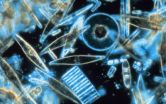(Press-News.org) In the future, warmer waters could significantly change ocean distribution of populations of phytoplankton, tiny organisms that could have a major effect on climate change.
Reporting in this week's online journal Science Express, researchers show that by the end of the 21st century, warmer oceans will cause populations of these marine microorganisms to thrive near the poles and shrink in equatorial waters.
"In the tropical oceans, we are predicting a 40 percent drop in potential diversity, the number of strains of phytoplankton," says Mridul Thomas, a biologist at Michigan State University (MSU) and co-author of the journal paper.
"If the oceans continue to warm as predicted," says Thomas, "there will be a sharp decline in the diversity of phytoplankton in tropical waters and a poleward shift in species' thermal niches--if they don't adapt."
Thomas co-authored the paper with scientists Colin Kremer, Elena Litchman and Christopher Klausmeier, all of MSU.
"The research is an important contribution to predicting plankton productivity and community structure in the oceans of the future," says David Garrison, program director in the National Science Foundation's (NSF) Division of Ocean Sciences, which funded the research along with NSF's Division of Environmental Biology.
"The work addresses how phytoplankton species are affected by a changing environment," says Garrison, "and the really difficult question of whether adaptation to these changes is possible."
The MSU scientists say that since phytoplankton play a key role in regulating atmospheric carbon dioxide levels, and therefore global climate, the shift could in turn cause further climate change.
Phytoplankton and Earth's climate are inextricably intertwined.
"These results will allow scientists to make predictions about how global warming will shift phytoplankton species distribution and diversity in the oceans," says Alan Tessier, program director in NSF's Division of Environmental Biology.
"They illustrate the value of combining ecology and evolution in predicting species' responses."
The microorganisms use light, carbon dioxide and nutrients to grow. Although phytoplankton are small, they flourish in every ocean, consuming about half of the carbon dioxide emitted into the atmosphere.
When they die, some sink to the ocean bottom, depositing their carbon in the sediment, where it can be trapped for long periods of time.
Water temperatures strongly influence their growth rates.
Phytoplankton in warmer equatorial waters grow much faster than their cold-water cousins.
With worldwide temperatures predicted to increase over the next century, it's important to gauge the reactions of phytoplankton species, say the scientists.
They were able to show that phytoplankton have adapted to local temperatures.
Based on projections of ocean temperatures in the future, however, many phytoplankton may not adapt quickly enough.
Since they can't regulate their temperatures or migrate, if they don't adapt, they could be hard hit, Kremer says.
"We've shown that a critical group of the world's organisms has evolved to do well under the temperatures to which they're accustomed," he says.
But warming oceans may significantly limit their growth and diversity, with far-reaching implications for the global carbon cycle.
"Future models that incorporate genetic variability within species will allow us to determine whether particular species can adapt," says Klausmeier, "or whether they will face extinction."
INFORMATION:
Small marine organisms' big changes could affect world climate
Warmer future oceans could cause phytoplankton to thrive near poles, shrink in tropics
2012-10-26
ELSE PRESS RELEASES FROM THIS DATE:
Small organisms could dramatically impact world's climate
2012-10-26
EAST LANSING, Mich. — Warmer oceans in the future could significantly alter populations of phytoplankton, tiny organisms that could have a major impact on climate change.
In the current issue of Science Express, Michigan State University researchers show that by the end of the 21st century, warmer oceans will cause populations of these marine microorganisms to thrive near the poles and may shrink in equatorial waters. Since phytoplankton play a key role in the food chain and the world's cycles of carbon, nitrogen, phosphorous and other elements, a drastic drop could have ...
Individual gene differences can be tested in zebrafish
2012-10-26
HERSHEY, Pa. -- The zebrafish is a potential tool for testing one class of unique individual genetic differences found in humans, and may yield information helpful for the emerging field of personalized medicine, according to a team led by Penn State College of Medicine scientists. The differences, or mutations, in question create minor changes in amino acids -- the building blocks of DNA -- from person to person. Zebrafish can be used as a model to understand what biological effects result from these genetic mutations.
Personalized medicine uses modern technology and ...
Monster galaxy may have been stirred up by black-hole mischief
2012-10-26
Astronomers using the NASA/ESA Hubble Space Telescope have obtained a remarkable new view of a whopper of an elliptical galaxy, with a core bigger than any seen before. There are two intriguing explanations for the puffed up core, both related to the action of one or more black holes, and the researchers have not yet been able to determine which is correct.
Spanning a little over one million light-years, the galaxy is about ten times the diameter of the Milky Way galaxy. The bloated galaxy is a member of an unusual class of galaxies with an unusually diffuse core filled ...
Exercise boosts satisfaction with life, researchers find
2012-10-26
UNIVERSITY PARK, Pa. -- Had a bad day? Extending your normal exercise routine by a few minutes may be the solution, according to Penn State researchers, who found that people's satisfaction with life was higher on days when they exercised more than usual.
"We found that people's satisfaction with life was directly impacted by their daily physical activity," said Jaclyn Maher, graduate student in kinesiology. "The findings reinforce the idea that physical activity is a health behavior with important consequences for daily well-being and should be considered when developing ...
Robots in the home: Will older adults roll out the welcome mat?
2012-10-26
Robots have the potential to help older adults with daily activities that can become more challenging with age. But are people willing to use and accept the new technology? A study by the Georgia Institute of Technology indicates the answer is yes, unless the tasks involve personal care or social activities.
After showing adults (ages 65 to 93 years) a video of a robot's capabilities, researchers interviewed them about their willingness for assistance with 48 common household tasks. Participants generally preferred robotic help over human help for chores such as cleaning ...
New genes discovered for adult BMI levels
2012-10-26
A large international study has identified three new gene variants associated with body mass index (BMI) levels in adults. The scientific consortium, numbering approximately 200 researchers, performed a meta-analysis of 46 studies, covering gene data from nearly 109,000 adults, spanning four ethnic groups.
In discovering intriguing links to lipid-related diseases, type 2 diabetes and other disorders, the IBC 50K SNP Array BMI Consortium's study may provide fundamental insights into the biology of adult obesity. Scientists from the Center for Applied Genomics at The Children's ...
Academia should fulfill social contract by supporting bioscience startups, case study says
2012-10-26
Universities not only provide the ideal petri dish for cultivating bioscience with commercial potential, but have a moral obligation to do so, given the opportunity to translate public funding into health and jobs, according to a new case study by UCSF researchers.
In an analysis published Oct. 24, 2012 in Science Translational Medicine, researchers at the California Institute for Quantitative Biosciences (QB3) assessed the impact of the institute's efforts over the past eight years in supporting entrepreneurs on the three UC campuses in which it operates: UCSF, UC Berkeley ...
Scientists deepen genetic understanding of MS
2012-10-26
Five scientists, including two from Simon Fraser University, have discovered that 30 per cent of our likelihood of developing Multiple Sclerosis (MS) can be explained by 475,806 genetic variants in our genome. Genome-wide Association Studies (GWAS) commonly screen these variants, looking for genetic links to diseases.
Corey Watson, a recent SFU doctoral graduate in biology, his thesis supervisor SFU biologist Felix Breden and three scientists in the United Kingdom have just had their findings published online in Scientific Reports. It's a sub-publication of the journal ...
Sharing space:
2012-10-26
A new University of Michigan study shows that when researchers share a building, and especially a floor, the likelihood of forming new collaborations and obtaining funding increases dramatically.
The findings have wide relevance to corporations, as well.
"Our analyses clearly show that there are benefits to co-location," said Jason Owen-Smith, an associate professor of sociology and organizational studies.
Researchers who occupy the same building are 33 percent more likely to form new collaborations than researchers who occupy different buildings, and scientists who ...
New study brings a doubted exoplanet 'back from the dead'
2012-10-26
A second look at data from NASA's Hubble Space Telescope is reanimating the claim that the nearby star Fomalhaut hosts a massive exoplanet. The study suggests that the planet, named Fomalhaut b, is a rare and possibly unique object that is completely shrouded by dust.
"Although our results seriously challenge the original discovery paper, they do so in a way that actually makes the object's interpretation much cleaner and leaves intact the core conclusion, that Fomalhaut b is indeed a massive planet," said Thayne Currie, an astronomer formerly at NASA's Goddard Space ...
LAST 30 PRESS RELEASES:
Study reveals insights about brain regions linked to OCD, informing potential treatments
Does ocean saltiness influence El Niño?
2026 Young Investigators: ONR celebrates new talent tackling warfighter challenges
Genetics help explain who gets the ‘telltale tingle’ from music, art and literature
Many Americans misunderstand medical aid in dying laws
Researchers publish landmark infectious disease study in ‘Science’
New NSF award supports innovative role-playing game approach to strengthening research security in academia
Kumar named to ACMA Emerging Leaders Program for 2026
AI language models could transform aquatic environmental risk assessment
New isotope tools reveal hidden pathways reshaping the global nitrogen cycle
Study reveals how antibiotic structure controls removal from water using biochar
Why chronic pain lasts longer in women: Immune cells offer clues
Toxic exposure creates epigenetic disease risk over 20 generations
More time spent on social media linked to steroid use intentions among boys and men
New study suggests a “kick it while it’s down” approach to cancer treatment could improve cure rates
Milken Institute, Ann Theodore Foundation launch new grant to support clinical trial for potential sarcoidosis treatment
New strategies boost effectiveness of CAR-NK therapy against cancer
Study: Adolescent cannabis use linked to doubling risk of psychotic and bipolar disorders
Invisible harms: drug-related deaths spike after hurricanes and tropical storms
Adolescent cannabis use and risk of psychotic, bipolar, depressive, and anxiety disorders
Anxiety, depression, and care barriers in adults with intellectual and developmental disabilities
Study: Anxiety, gloom often accompany intellectual deficits
Massage Therapy Foundation awards $300,000 research grant to the University of Denver
Gastrointestinal toxicity linked to targeted cancer therapies in the United States
Countdown to the Bial Award in Biomedicine 2025
Blood marker from dementia research could help track aging across the animal world
Birds change altitude to survive epic journeys across deserts and seas
Here's why you need a backup for the map on your phone
ACS Central Science | Researchers from Insilico Medicine and Lilly publish foundational vision for fully autonomous “Prompt-to-Drug” pharmaceutical R&D
Increasing the number of coronary interventions in patients with acute myocardial infarction does not appear to reduce death rates
[Press-News.org] Small marine organisms' big changes could affect world climateWarmer future oceans could cause phytoplankton to thrive near poles, shrink in tropics



